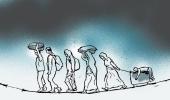Two global health experts on Wednesday said novel coronavirus infection is here to stay for more than a year and called for aggressive testing to prevent its spread.

While United States health expert Professor Ashish Jha exuded confidence that a vaccine for the highly infectious disease will be available in a year's time, Professor Johan Giesecke from Sweden said India should adopt a 'soft' lockdown as a severe one will ruin its economy.
In an interaction with Congress leader Rahul Gandhi, the experts talked extensively about the COVID-19 pandemic as part of the series being aired on Congress social media channels.
"When the economy is opened up post lockdown, you (India) have to create confidence among people," Prof Jha told Gandhi.
Jha is a professor of Global Health at the TH Chan School of Public Health and Director, Harvard Global Health institute.
He said coronavirus is a '12-18 months' problem and the world will not be free of this till 2021.
The expert also called for the need for aggressive testing strategy for high-risk areas to arrest the spread of the disease.
Rahul Gandhi, while interacting with the experts, noted that life is going to change post COVID-19.
"People say 9/11 was a new chapter. This (COVID-19) is a new book," he remarked.
Prof Giesecke, former chief scientist at the European Centre for Disease Prevention and Control said, "The situation that India is in, I think, you should have a soft lockdown, as soft as possible."
He said the disease is spreading across the globe like a wildfire and almost everyone in the world will be infected.
The Swedish health expert said relaxing the lockdown has to be step-wise.
"You wait 2-3 weeks and see what happens. Do we see more spread of the disease? If yes, we take one step back and try another restriction. So I think it will take months to really ease out the lockdown completely. But you must bring one restriction at a time and see what happens," he opined.
Prof Jha commented that the world is entering an "age of pandemics".
"I am confident that this is not the last large global pandemic you and I are going to see in the next 20 years," he said.
"This virus has existed in bats but there was a small change probably in the genome and all of a sudden it became suitable for human hosts. I think climate change is going to make many of these things all the more worse and then of course, the other things that has happened with economic growth is that people are eating lot more meat. So that also means more interactions between humans and animals," he said.
Jha noted that in the last 100 years one had seen an increasing frequency of these kinds of outbreaks and this one is the worst in a 100 years.
"But I am confident that we are going to have more global pandemics in the upcoming years and decades. And so as we get through this one, we have to ask ourselves, how we are going to better prepare for the next one," he said.
The expert also emphasised on the need for an aggressive testing strategy to combat the COVID-19 menace.
He said testing everybody is difficult, but there are strategies that one can use to augment testing like pool testing.
Jha said the country should go for "vigorous testing, tracing and isolation".
"But if you cannot do that, then you have to lock everything down. But of course, it has very substantial economic repercussions," he said.
The Harvard Global Health institute director also noted that life will be very different when the lockdown ends.
"So now when you reopen the economy, you have to create a certain level of confidence. Because the economy resides on confidence. If people are scared, they will not engage in economic activity.
"It is a complicated thing. I have not seen any country in the world do it brilliantly. But everybody is kind of making their way through this," he observed.
On the testing strategy, Prof Jha said, anybody who gets admitted to a hospital for almost any reason in an area with any kind of outbreak should be tested.
"You need an aggressive testing strategy in high-risk areas or in homes for elderly people. And then if you can, you want to be doing more community level surveillance. Just to make sure that you are not missing undetected cases," the US health expert asserted.
He said India has many advantages and one of them is a very advanced and vibrant technology.
On the chances of finding a vaccine for COVID-19, Jha said one can see some promise in two-three vaccines, including the ones in the United States and China.
"All three look promising to me," he said, wondering which one will work.
"Maybe, all of them or maybe one vaccine will come... but I am confident that a vaccine somewhere will come out by next year that will work and then India has to have a plan on how much it needs," he said.
Meanwhile, Rahul Gandhi said large urban centers will get hurt badly.
He hoped the disease will bring people together and make them realise that you cannot fight this disease as different religions, communities, castes or genders.
"I think in some ways there is a potential opportunity here. There is an opportunity that in fighting this disease, we are able to start a conversation and understand that everybody is required to fight this disease together," he said.











 © 2025
© 2025